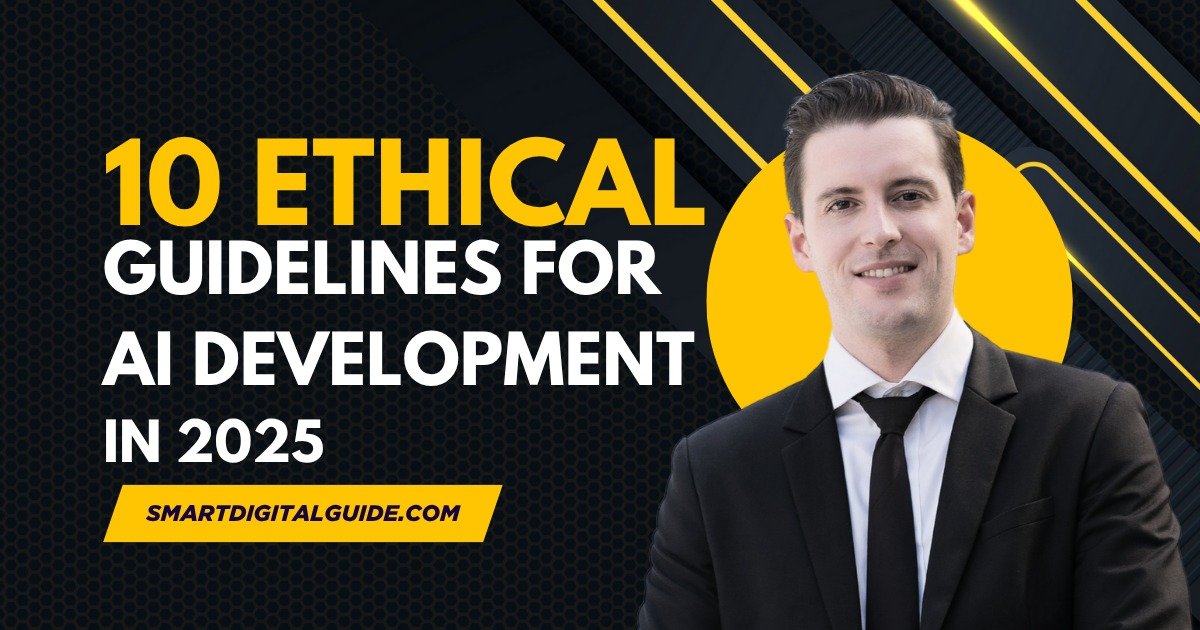Artificial Intelligence (AI) is rapidly revolutionizing the technological landscape. Across various sectors, from medical advancements to sophisticated automation, AI is enhancing industries globally. Yet, this swift progression underscores the necessity for ethical guidelines governing AI that guarantee technology serves humanity positively without inflicting harm.
In this article by Smart Digital Guide, we will delve into the 10 Ethical Guidelines for AI Development in 2025 that should be adhered to by every developer, organization, and policymaker. These principles aim to foster the creation of trustworthy, equitable, and secure AI systems that benefit society as a whole.

1. Transparency in AI Systems
Transparency stands as one of the key ethical principles guiding AI development in 2025. It is essential for AI developers to guarantee that users grasp the functioning and decision-making processes of AI algorithms. Providing clear documentation and creating explainable AI models are vital steps in fostering trust and minimizing potential misuse.
2. Data Privacy and Security
AI systems are heavily dependent on data. Protecting user privacy is essential to avoid the misuse of personal information. Developers must comply with strict data protection regulations and safeguard sensitive data through encryption methods. This strategy ensures ethical AI development while maintaining user trust.
3. Avoiding Bias in AI Algorithms
A significant challenge in the realm of AI is algorithmic bias. To promote ethical advancements in AI by 2025, it is essential to emphasize fairness through the utilization of varied datasets and regular assessments of AI models. This approach guarantees that AI systems do not show discrimination against individuals based on characteristics such as race, gender, or other traits.
4. Accountability and Responsibility
When artificial intelligence makes mistakes, who is held accountable? It is crucial to define responsibility in the standards for AI development. Developers and organizations must be responsible for the choices and consequences of their AI systems, making sure they do not inflict harm on individuals or society as a whole.
5. Human-Centric AI Design
Ethical AI must focus on the well-being of humanity. By 2025, developments in AI technologies should aim to improve human existence rather than substituting or endangering it. A human-centered approach guarantees that AI uplifts human abilities instead of posing risks to jobs or security.
6. Environmental Sustainability in AI
The development of artificial intelligence requires significant energy and resource utilization. In 2025, ethical standards focus on promoting sustainable AI methods, which include employing energy-efficient models and environmentally-friendly data centers. This approach helps to minimize the ecological impact of AI technologies.
7. Continuous Monitoring and Evaluation
AI systems need to be actively monitored and tested following their deployment. Developers have a responsibility to regularly evaluate their performance to avert potential negative impacts. Ethical AI principles suggest conducting regular audits to maintain safety, fairness, and reliability.
8. Collaboration and Global Standards
The advancement of ethical AI in 2025 necessitates worldwide collaboration. Establishing international standards and fostering cross-industry partnerships facilitate the creation of AI systems that operate ethically on a global scale. This approach helps prevent disputes arising from inconsistent regulations across various nations.
9. Protection Against Misuse of AI
The possibilities of AI technology include both beneficial and harmful uses. It is vital for developers to establish safeguards to prevent malicious applications, like deepfakes, cybersecurity risks, and perilous autonomous weapon systems. Formulating ethical guidelines is important to guarantee that AI is employed in a responsible manner.
10. Promoting Education and Awareness
To ensure AI is ethical, it is essential for everyone, including developers and end users, to grasp its implications. Organizations ought to allocate resources towards AI ethics training initiatives and promote awareness regarding the responsible utilization of AI. This approach guarantees a more secure digital future for everyone.
Final Thoughts
The progress of artificial intelligence is unstoppable, but it demands guidance through strong ethical guidelines. By following these ten principles for AI development by 2025, organizations and creators can develop technology that is fair, transparent, and beneficial to society.
At Smart Digital Guide, we believe that responsible innovation is vital for the future of AI. Maintaining ethics in AI is not just an option—it’s crucial for cultivating a trustworthy and sustainable digital environment.








